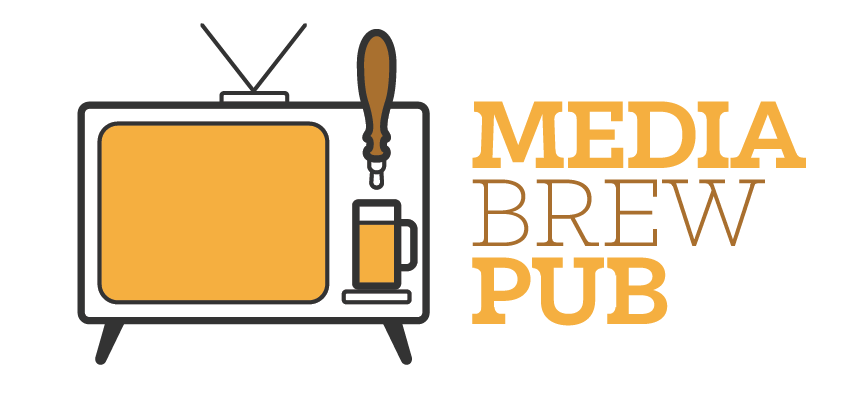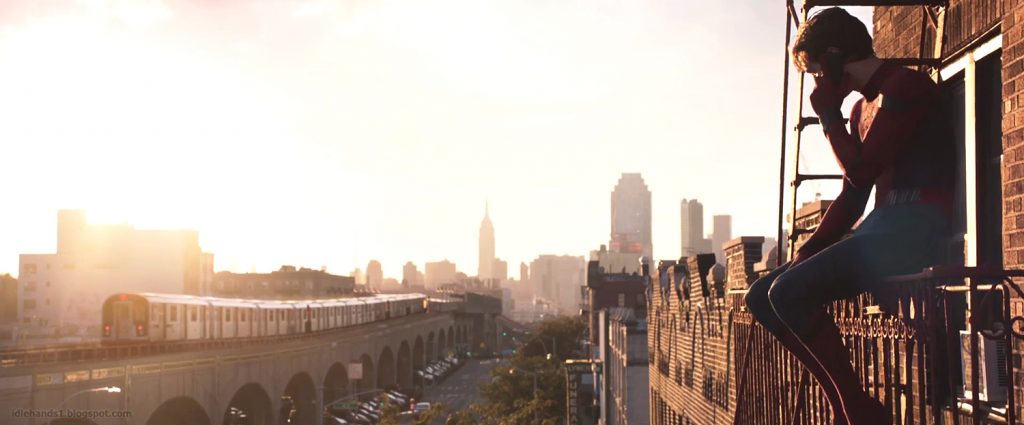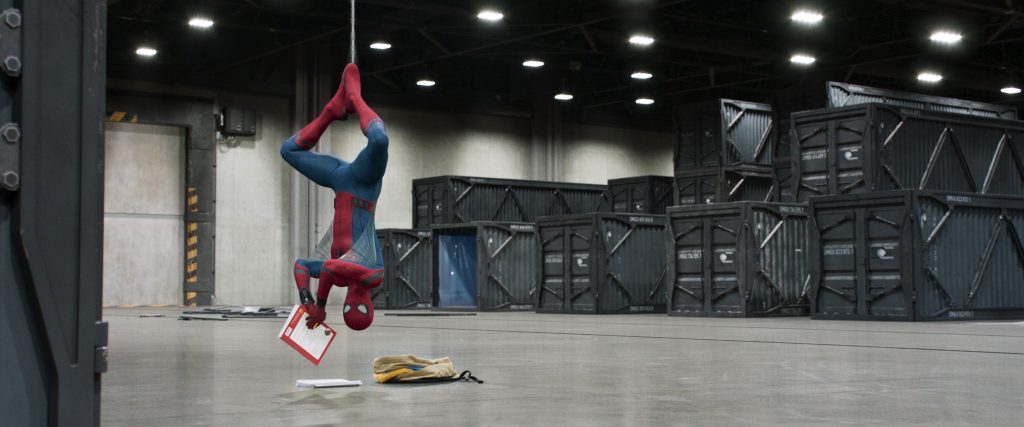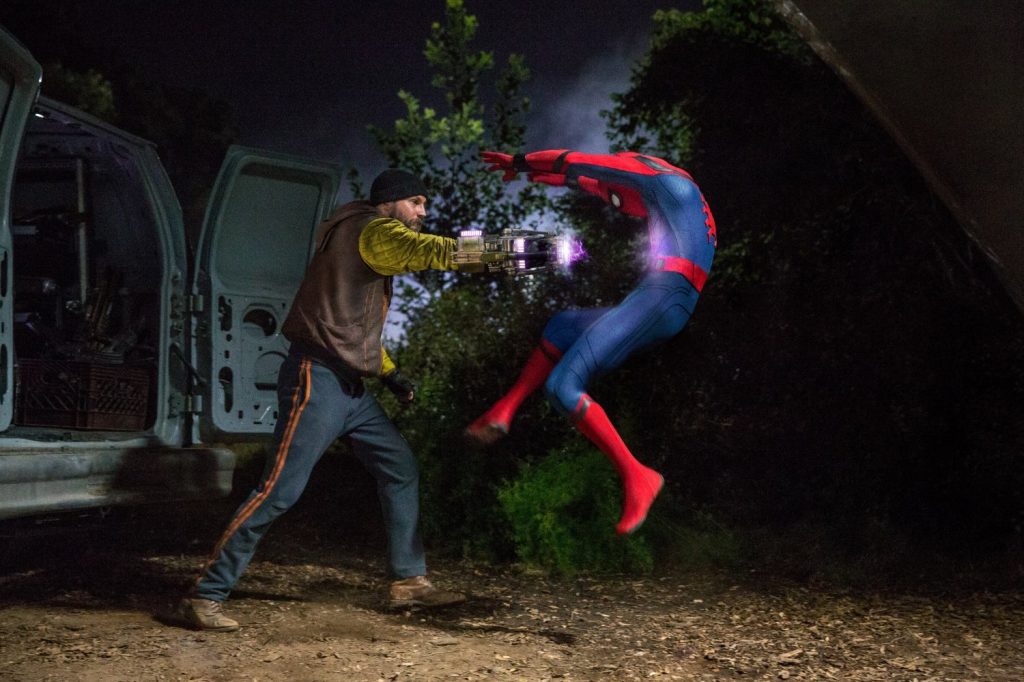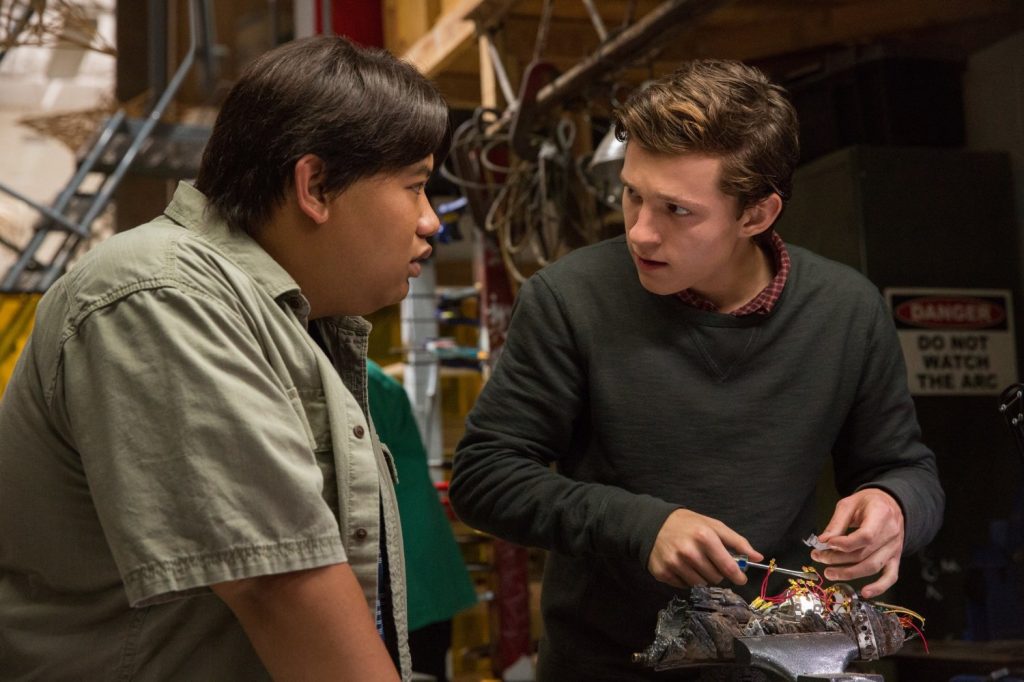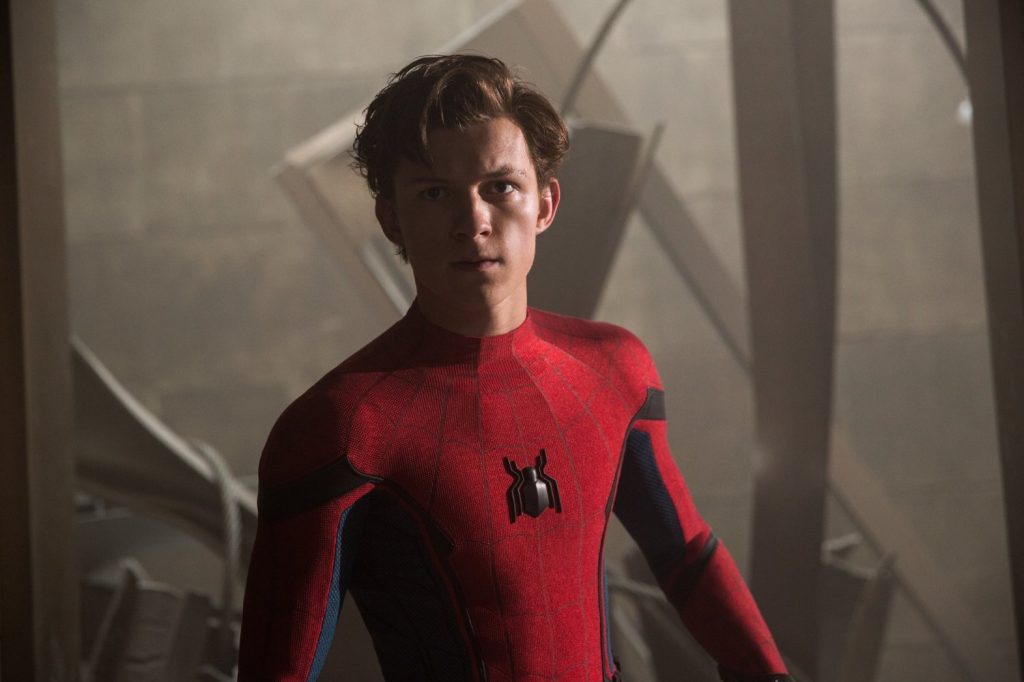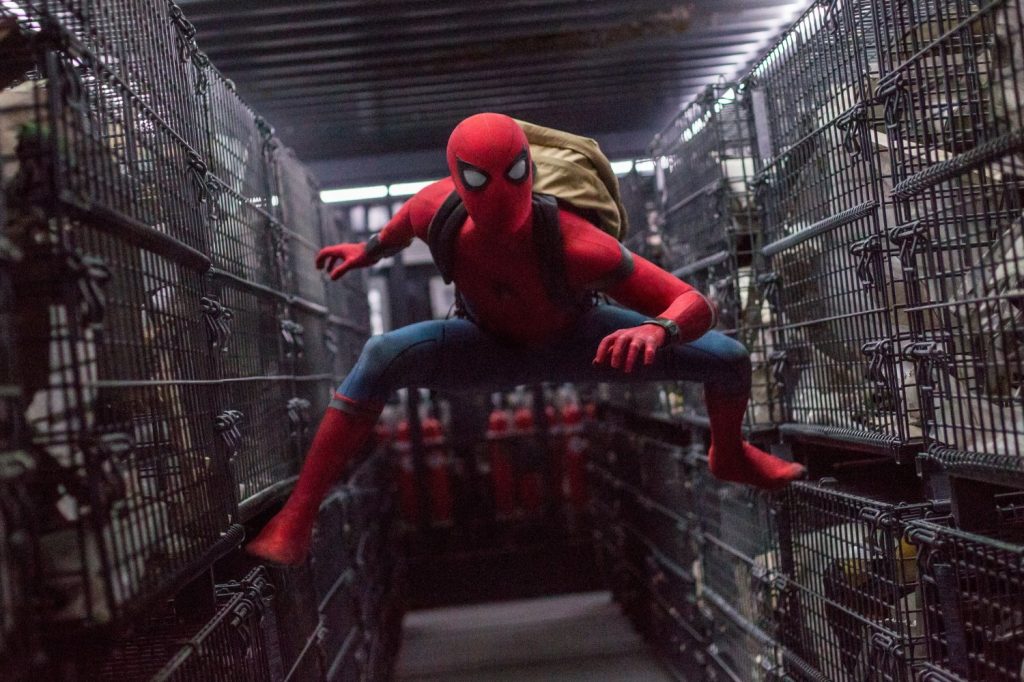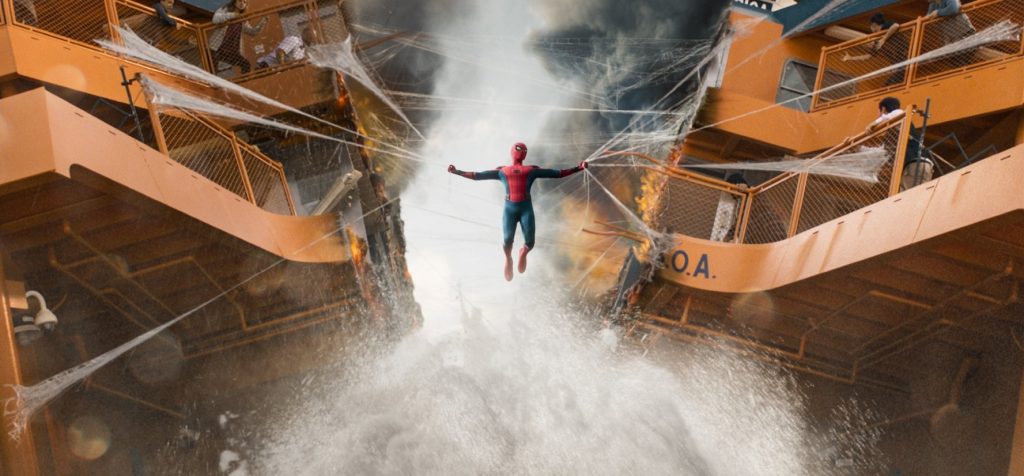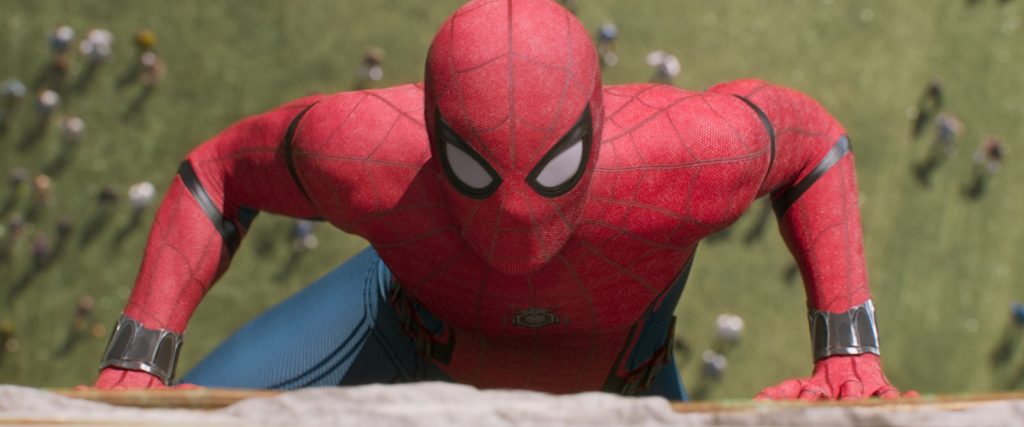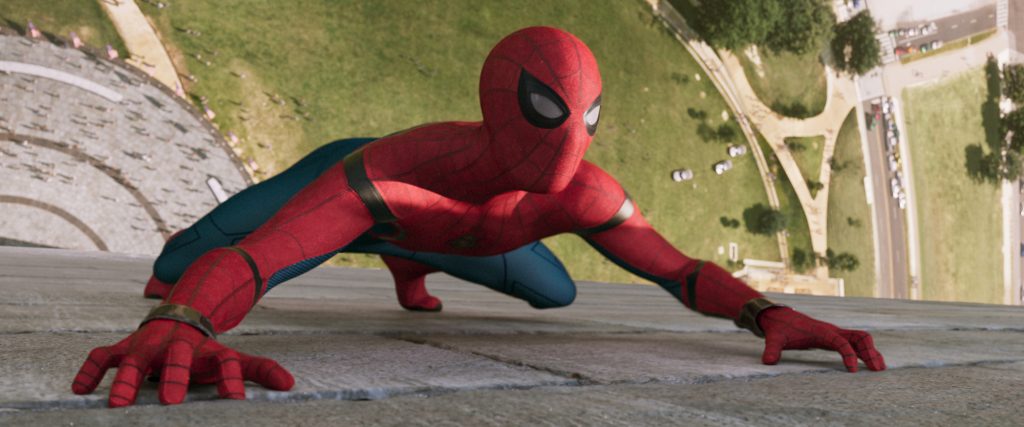 Title: Spider-Man: Homecoming | Rated: PG-13 | Runtime: 133 min | Theaters nationwide
Title: Spider-Man: Homecoming | Rated: PG-13 | Runtime: 133 min | Theaters nationwide
The summer blockbuster season rolls on, and accompanying it is another edition of the High-Low Report! Receiving an evaluation from the MediaBrewPub doctors today is none other than Spider-Man: Homecoming, the latest installment in the MCU (Marvel Cinematic Universe) as well as the most recent attempt to bring the titular web-slinger to the big screen. Andrew and Jun are back, but they’re not just the low-brow and high-brow respectively today. See, Andrew is MBP’s resident Spider-Man fan, so we can expect a very personal and loving assessment from him, whereas Jun has grimly put on his critic’s cap. A heated exchange between these two should be on the cards tonight, folks. While they will venture into spoiler territory, spoiler tags have been added, so consider this a safe read if you haven’t seen the film.
Andrew’s thoughts are in red, and Jun’s in blue.
Jun, I don’t know how to begin with this. You know how much I love Spider-Man. I love him so much that I’m entertained by flawed products (I’m looking at you, not so Amazing Spider-Man 2). You know that entertainment is the number one driver for me, and if you give me two hours of pretty much anything Spider-Man, I’m in. So imagine my joy when I’m watching Captain America: Civil War and I see the kickass job Tom Holland did, rocking the timeless red and blue of your friendly neighborhood Spider-Man… I damn near spider-splooged on the screen.
Jun, this was better than that. So, so much better.
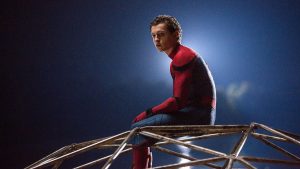 You know I base pretty much all comic book movies off of how they stack up to Spider-Man 2 (which, to this day, I say deserves to be considered one of the best superhero films of all time), and Homecoming kicked that to the curb like Blac Chyna.
You know I base pretty much all comic book movies off of how they stack up to Spider-Man 2 (which, to this day, I say deserves to be considered one of the best superhero films of all time), and Homecoming kicked that to the curb like Blac Chyna.
Now before you push back, because there are probably flaws in Homecoming that I’m missing compared to the cinematic masterpiece of SM2, it all boils down to one thing and one thing only: Peter Parker.
Moreso than any other superhero, it is the secret identity that drives Spider-Man. I don’t read Spider-Man for his heroic feats, I read it for Peter Parker’s humanity. And Tom Holland nailed Peter Parker. Up to this point, I always preferred Tobey Maguire to Andrew Garfield because while Garfield got the Spider-Man part right (always cracking wise), he never captured the nerdy, outcast side of Peter that Maguire did. But Maguire never had the humor or endearing awkwardness (or for that matter, the ability to come off as a teenager) that Holland has captured.
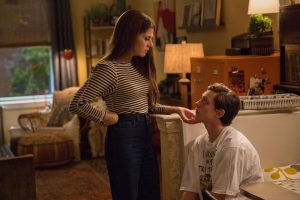 Tom Holland nailed this fucking part; you could have thrown the plot of Spider-Man 3 in there and I probably would have been fine. He is the first Peter that actually comes off being a kid. He is the first Peter that really showed how cruel being Spider-Man is for a high school outcast who wants nothing more than to be cool. He is the first Peter whose voice sounds like it’s going to crack. He is the first Peter that leaves you in awe of his abilities, but also promotes a instinct to protect him from the harsher realities of the world. And he is the first Spider-Man that, in my personal opinion, carries the weight of the now ubiquitous quote, “With great power comes great responsibility.” Compared to previous iterations, you get a sense of the scope of responsibility that Peter faces, nay, demands – but also a sense of just how limited and naive he is. Tom Holland is Exhibits A-Z on why this is my favorite superhero movie.
Tom Holland nailed this fucking part; you could have thrown the plot of Spider-Man 3 in there and I probably would have been fine. He is the first Peter that actually comes off being a kid. He is the first Peter that really showed how cruel being Spider-Man is for a high school outcast who wants nothing more than to be cool. He is the first Peter whose voice sounds like it’s going to crack. He is the first Peter that leaves you in awe of his abilities, but also promotes a instinct to protect him from the harsher realities of the world. And he is the first Spider-Man that, in my personal opinion, carries the weight of the now ubiquitous quote, “With great power comes great responsibility.” Compared to previous iterations, you get a sense of the scope of responsibility that Peter faces, nay, demands – but also a sense of just how limited and naive he is. Tom Holland is Exhibits A-Z on why this is my favorite superhero movie.
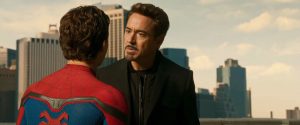 Fortunately, there are Exhibits 1-12 and beyond to help make this more than just one great performance. The diversity of the supporting cast was refreshing, Michael Keaton’s Vulture is my favorite villain since Loki (although Zemo is close, he just lacked the fun of having legitimate powers), the easter eggs were on point, Robert Downey, Jr. killed it as Tony Stark (as expected), and the entire feel and flow of the story was unique to the MCU in that it tied in but also did a good job bringing it down to a human level. How refreshing was it to see that, hey, superheroes do more than just save the world – they save the man who makes the best sandwiches in Queens. It felt accessible.
Fortunately, there are Exhibits 1-12 and beyond to help make this more than just one great performance. The diversity of the supporting cast was refreshing, Michael Keaton’s Vulture is my favorite villain since Loki (although Zemo is close, he just lacked the fun of having legitimate powers), the easter eggs were on point, Robert Downey, Jr. killed it as Tony Stark (as expected), and the entire feel and flow of the story was unique to the MCU in that it tied in but also did a good job bringing it down to a human level. How refreshing was it to see that, hey, superheroes do more than just save the world – they save the man who makes the best sandwiches in Queens. It felt accessible.
But had they failed Peter Parker, all that would have been for naught. Thank you, Tom Holland. So… do you even want to talk about this with me, or should I just go spend another ten bucks and watch it again – tissue optional (for tears of joy, I swear)?
I think you’re going to need more than just a tissue for your next trip to the theater, Andrew – perhaps a spare pair of shorts and underwear?
To preface, I think quite highly of Sam Raimi’s Spider-Man and simply love Spider-Man 2. While Captain America: Civil War is my favorite superhero film, I’d say that for the genre, Spider-Man 2 is an absolute masterclass in storytelling – which is why for over a decade, I proclaimed it as the best superhero film until Civil War came knocking. I highly encourage anyone to check out MovieBob’s thorough and thought-provoking video essay on why Raimi’s first two Spider-Man films are great pieces of cinema. Such is their impact that any Spider-Man film must be compared to them.
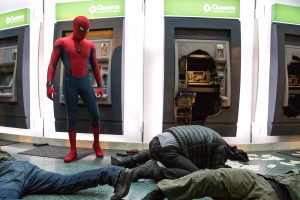 For the record, I like Spider-Man: Homecoming. It’s fun, spirited, and confidently sets itself apart from the other films featuring the titular web-slinger. I honestly think I would like it more if it weren’t for the fact that Spider-Man and Spider-Man 2 exist. If this means what you think it means, you’re right: the Raimi films color my opinion of this film. Is that unfair? Probably. Can I help it? No, and over the course of this High-Low Report, I will explain why.
For the record, I like Spider-Man: Homecoming. It’s fun, spirited, and confidently sets itself apart from the other films featuring the titular web-slinger. I honestly think I would like it more if it weren’t for the fact that Spider-Man and Spider-Man 2 exist. If this means what you think it means, you’re right: the Raimi films color my opinion of this film. Is that unfair? Probably. Can I help it? No, and over the course of this High-Low Report, I will explain why.
But first, Peter. When watching Civil War last year, I was impressed with Tom Holland’s performance but stopped short of calling him the best Peter/Spider-Man since his true test lay with his own feature film. Now that the film has finally arrived, he can take a bow. He is Peter Parker. He is Spider-Man. And he is the film’s trump card. I agree with your assessments of Maguire and Garfield, and I like them for different reasons (Maguire for his Peter performance, and Garfield for his Spider-Man one). You cannot emphasize enough how integral Holland’s adolescence is in making his Peter/Spider-Man fly. Not only does he look like a fifteen-year-old kid (something you could never say for both Maguire and Garfield), he effortlessly acts just like one. There’s the desire to impress his peers and his idol Tony, the mix of cockiness and inexperience, the tendency to annoy and whine, and the rebelliousness. All this comes through – both when he’s in the suit and out of it – and humanizes him. Bravo, Holland, bravo.
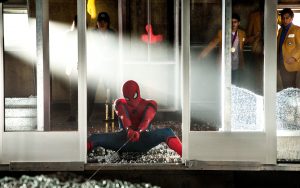 As you mentioned, there’s a lot to like about the film. It emphasizes the diversity of New York City, I dig Michael Giacchino’s playful score, and the actors playing the secondary characters – particularly Peter’s classmates – are good. Whatever fears I had about Tony overshadowing Peter’s journey are put to bed since he actually takes more of a back seat than expected without diminishing his impact on Peter and the story.
As you mentioned, there’s a lot to like about the film. It emphasizes the diversity of New York City, I dig Michael Giacchino’s playful score, and the actors playing the secondary characters – particularly Peter’s classmates – are good. Whatever fears I had about Tony overshadowing Peter’s journey are put to bed since he actually takes more of a back seat than expected without diminishing his impact on Peter and the story.
Speaking of the other characters, let’s get into them. Who are your favorites, and how much do you like the film’s iterations of the comic book characters? Plus, we all know that the strength of a Spidey film does tend to depend rather heavily on its villains, so I’d love to hear your thoughts on Adrian Toomes/Vulture and Shocker (Bokeem Woodbine).
I’m not surprised that you prefer Spider-Man 2 over Homecoming. Leaving the theater, the wife asked me if this was my favorite Spider-Man film and I did pause. SM2 was great stuff. However, I’m shocked that you put Spider-Man above this entry as well. I feel that at the very least, Homecoming should be second of the group. I’m curious to hear why it didn’t make it that high in your perspective.
 The side characters were all a great change of pace from the typical comic book movie genre. The high school setting provided a great opportunity to highlight different types of characters that really don’t exist in the adult world. I thought Ned Leeds (Jacob Batalon) made a great best friend and confidant, and as a Calvin and Hobbes fan, I couldn’t help but think of all the times Calvin would annoy the hell out of his dad by asking him endless questions about things that he really shouldn’t be asking about. Batalon did a great job flaming the fire of Holland’s enthusiastic and curious personality regarding the life and talents of a superhero, and the two of them combined had a wonderfully geeky chemistry. The completion of the LEGO Death Star (or whatever Star Wars Lego product they were making) was really endearing, and this movie was filled with subtle emotional moments that made you appreciate the characters. If you read Miles Morales as Spider-Man, you’ll appreciate that they stole the overweight Asian best friend from him.
The side characters were all a great change of pace from the typical comic book movie genre. The high school setting provided a great opportunity to highlight different types of characters that really don’t exist in the adult world. I thought Ned Leeds (Jacob Batalon) made a great best friend and confidant, and as a Calvin and Hobbes fan, I couldn’t help but think of all the times Calvin would annoy the hell out of his dad by asking him endless questions about things that he really shouldn’t be asking about. Batalon did a great job flaming the fire of Holland’s enthusiastic and curious personality regarding the life and talents of a superhero, and the two of them combined had a wonderfully geeky chemistry. The completion of the LEGO Death Star (or whatever Star Wars Lego product they were making) was really endearing, and this movie was filled with subtle emotional moments that made you appreciate the characters. If you read Miles Morales as Spider-Man, you’ll appreciate that they stole the overweight Asian best friend from him.
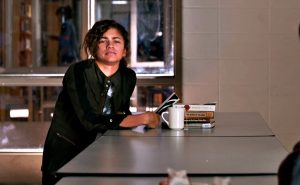 I’ve heard mixed reviews about Michelle (Zendaya), and while I don’t think she was a plot driver in any way, she represented the typical intelligent millennial. Having spent my career working with college students, she was the best combination of self-assured and insecure. Her combination of intelligence, self-awareness, overconfidence, and skepticism provides a wonderful foil for Peter’s own genius, curiosity, naivete, and obliviousness. In particular, I found that she did a great job quietly pining over Peter – reminding the audience that while Peter lacks self-esteem outside of his suit, there are those who love and appreciate him. I’m excited to see how the two characters interact in the future. Zendaya also owned my favorite non-Holland moment of the film as she hilariously represented #BlackLivesMatter by shutting down Mr. Harrington’s (Martin Starr, a pleasant addition considering the subtle parallels between Peter’s group and Starr’s group in Freaks and Geeks) attempt to get her to appreciate the Washington Monument. Her behavior highlights both the most amusing and most obtuse aspects of her generation.
I’ve heard mixed reviews about Michelle (Zendaya), and while I don’t think she was a plot driver in any way, she represented the typical intelligent millennial. Having spent my career working with college students, she was the best combination of self-assured and insecure. Her combination of intelligence, self-awareness, overconfidence, and skepticism provides a wonderful foil for Peter’s own genius, curiosity, naivete, and obliviousness. In particular, I found that she did a great job quietly pining over Peter – reminding the audience that while Peter lacks self-esteem outside of his suit, there are those who love and appreciate him. I’m excited to see how the two characters interact in the future. Zendaya also owned my favorite non-Holland moment of the film as she hilariously represented #BlackLivesMatter by shutting down Mr. Harrington’s (Martin Starr, a pleasant addition considering the subtle parallels between Peter’s group and Starr’s group in Freaks and Geeks) attempt to get her to appreciate the Washington Monument. Her behavior highlights both the most amusing and most obtuse aspects of her generation.
Outside of those two, I enjoyed but wouldn’t gush over the remaining kiddos. Flash (Tony Revolori, who I loved in Dope) was ineffably underwhelming for me and Liz (Laura Harrier) did not become compelling as a character until the big plot twist. However, I think they represented characters that needed to be present: the snarky bully of today and the girl whom everyone loves because she’s not only attractive but is a solid and intelligent person. They felt more necessary than enjoyable, if that makes any sense.
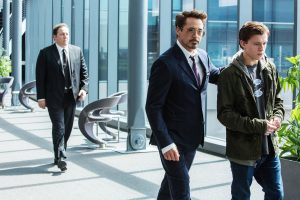 The adult supporting cast did everything right. They were there to lift up and shine a light on Peter and his crew. Each one brought a charming element to the film, whether it be through their demeanor (Hannibal Buress did a great job providing comic relief without showing up key characters) or easter eggs (Is that Captain America’s buddy from Captain America: The First Avenger? Oh wait, it must be his grandson!). Marisa Tomei was great as hot Aunt May and with the end reveal, I’m excited to see a more in-depth look at her relationship with Peter. While deflecting the constant barrage of men hitting on her (which is amusing), it’s clear that she and Holland have created a good chemistry as family members, and they’d be doing a disservice by not trying to create a similarly kickass Aunt May to the one in the Ultimate universe. She slaps Captain America, for crying out loud! Tony and Happy – how brilliant were they? RDJ can play that role in his sleep but his role as a mentor really blew me out of the water. When he took away the suit, man, that was heavy. I’ve enjoyed Happy’s evolution from clumsy lapdog to surly right-hand man, and while he frustrated me with his treatment of Peter throughout the film, it was all worth it to see him come around at the end.
The adult supporting cast did everything right. They were there to lift up and shine a light on Peter and his crew. Each one brought a charming element to the film, whether it be through their demeanor (Hannibal Buress did a great job providing comic relief without showing up key characters) or easter eggs (Is that Captain America’s buddy from Captain America: The First Avenger? Oh wait, it must be his grandson!). Marisa Tomei was great as hot Aunt May and with the end reveal, I’m excited to see a more in-depth look at her relationship with Peter. While deflecting the constant barrage of men hitting on her (which is amusing), it’s clear that she and Holland have created a good chemistry as family members, and they’d be doing a disservice by not trying to create a similarly kickass Aunt May to the one in the Ultimate universe. She slaps Captain America, for crying out loud! Tony and Happy – how brilliant were they? RDJ can play that role in his sleep but his role as a mentor really blew me out of the water. When he took away the suit, man, that was heavy. I’ve enjoyed Happy’s evolution from clumsy lapdog to surly right-hand man, and while he frustrated me with his treatment of Peter throughout the film, it was all worth it to see him come around at the end.
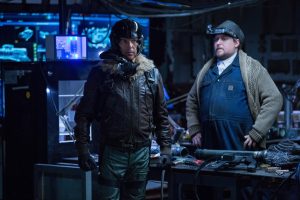 And that brings me to the villains… Shocker and Vulture. Shocker felt like a bit of a throwaway but I did enjoy Woodbine’s performance. In fact, I liked that whole crew – the backstory was handled deftly. Toomes becoming Vulture in response to losing his livelihood as a consequence of the Avengers, that was great. I actually find that backstory more compelling than the comics’. Toomes and his gang had a level of sympathy that you don’t often get with villains, and the MCU has done a good job creating antagonists that have sympathetic motives. Given the tone of Spider-Man stories, Keaton could have easily played his role in a cheesy manner – thank God he didn’t. He was gritty, intimidating, and charming. The reveal that he was Liz’s father really tied everything together in an interesting way and made him more human while also forcing Parker to make another difficult choice regarding power and responsibility. It’s much harder to take down a villain who understands who you are and where you come from – Keaton did a great job representing the voice of the “little guy.” I really hope they bring him back.
And that brings me to the villains… Shocker and Vulture. Shocker felt like a bit of a throwaway but I did enjoy Woodbine’s performance. In fact, I liked that whole crew – the backstory was handled deftly. Toomes becoming Vulture in response to losing his livelihood as a consequence of the Avengers, that was great. I actually find that backstory more compelling than the comics’. Toomes and his gang had a level of sympathy that you don’t often get with villains, and the MCU has done a good job creating antagonists that have sympathetic motives. Given the tone of Spider-Man stories, Keaton could have easily played his role in a cheesy manner – thank God he didn’t. He was gritty, intimidating, and charming. The reveal that he was Liz’s father really tied everything together in an interesting way and made him more human while also forcing Parker to make another difficult choice regarding power and responsibility. It’s much harder to take down a villain who understands who you are and where you come from – Keaton did a great job representing the voice of the “little guy.” I really hope they bring him back.
Phew, that’s a lot! So let’s hear it. Tell me why this is inferior. Was it the side characters? Did you not find the story compelling? Also, how awesome was the suit? We’ve got to talk about it because there’s no way you can crap on that.
The secondary characters are, for the most part, fine. A handful are great, some are inoffensive (adequate, if you will), and others I’m rather mixed on. Thankfully, there’s no one whom I think is terrible.
Let’s start with the better ones. I echo your enthusiasm for Ned. For the character, the filmmakers and Batalon achieve this nice balance between a moral compass and a best friend who shares Peter’s geekiness and enthusiasm for life as a superhero. He’s given a lot of room to develop, and Batalon’s chemistry with Holland is simply charming. I’m surprised that you’re underwhelmed by Flash, so I wonder what about him you don’t like. Revolori’s portrayal of the character as an attention-seeking and insufferable rich prat is a breath of fresh air when compared to previous iterations, and he does bring some fun to this high school environment with his “Penis Parker” comments and slap to Peter’s bottom.
 Now onto the inoffensive. I like Martin Starr’s role here, particularly his interactions with the actors playing his students. I was excited to hear a while back that Abraham Attah (Beasts of No Nation) and Angourie Rice (The Nice Guys) were cast, but their characters Abraham and Betty Brant are basically window dressing. They’re solid, but to me they personify one of my criticisms about the film: it needs more “high school moments.”
Now onto the inoffensive. I like Martin Starr’s role here, particularly his interactions with the actors playing his students. I was excited to hear a while back that Abraham Attah (Beasts of No Nation) and Angourie Rice (The Nice Guys) were cast, but their characters Abraham and Betty Brant are basically window dressing. They’re solid, but to me they personify one of my criticisms about the film: it needs more “high school moments.”
Right then, the mixed bag. I have to say, I’m baffled by your ringing endorsement for Michelle. Like you, I dig Zendaya’s performance and humor, but honestly, considering that her character seemed to feature a bit prominently in the film’s marketing, I’m taken aback by how little she’s in the story. She shares no major emotional scene of note with anyone, and the film more often than not uses her as a punchline for a comedic moment. Marisa Tomei makes a great Aunt May, and her relationship with Peter has a down-to-earth vibe that makes it stand apart. I get it, she’s attractive, but I was put off by the amount of jokes that revolve around this and try to hammer it in. I have to agree with you regarding Liz. Laura Harrier is quite good, but like you said, her character doesn’t evolve beyond being the love interest until late on, and even then, the film just leaves her behind. Jon Favreau is funny as Happy, but his treatment of Peter seems a bit out of place for the character – it feels like a specifically designed plotline, and let’s be honest: there’s no reason for Happy to be here. On the other hand, I like how Tony’s quips about Happy appear to poke fun at Favreau’s continued involvement in the MCU even after he stopped directing after Iron Man 2.
 Part of why I rate Homecoming below Spider-Man revolves around how it uses its primary villain. Before I continue, allow me to say that Woodbine (who, of course, does not play the villain in question – which is why I’m saying this now) is terrific despite Shocker being, as you mentioned, a throwaway. Now, back to the main villain. To me, what makes the Spider-Man films stand apart from the other superhero movies is how they make us empathize with their villains (with Amazing Spider-Man 2 being an exception since all of its villains are petulant). In a sense, their own journeys matter just as much as Peter’s, and that drives home their tragedy: they’re irresponsible with their great power. Raimi’s first two Spider-Man films do this so incredibly well. Willem Dafoe’s Norman Osborn/Green Goblin and Alfred Molina’s Otto Octavius/Doc Ock belong in the pantheon of movie supervillains, with the latter still being the best one ever. It’s not just that their performances are superb; it’s that you feel every ounce of their characters’ emotions and understand their decisions over the course of their journeys. That’s a character arc done right. That’s fantastic storytelling. What makes this tick is that Raimi presented them honestly, with nothing to hide.
Part of why I rate Homecoming below Spider-Man revolves around how it uses its primary villain. Before I continue, allow me to say that Woodbine (who, of course, does not play the villain in question – which is why I’m saying this now) is terrific despite Shocker being, as you mentioned, a throwaway. Now, back to the main villain. To me, what makes the Spider-Man films stand apart from the other superhero movies is how they make us empathize with their villains (with Amazing Spider-Man 2 being an exception since all of its villains are petulant). In a sense, their own journeys matter just as much as Peter’s, and that drives home their tragedy: they’re irresponsible with their great power. Raimi’s first two Spider-Man films do this so incredibly well. Willem Dafoe’s Norman Osborn/Green Goblin and Alfred Molina’s Otto Octavius/Doc Ock belong in the pantheon of movie supervillains, with the latter still being the best one ever. It’s not just that their performances are superb; it’s that you feel every ounce of their characters’ emotions and understand their decisions over the course of their journeys. That’s a character arc done right. That’s fantastic storytelling. What makes this tick is that Raimi presented them honestly, with nothing to hide.
This brings me to Vulture. I have no qualms with declaring that Michael Keaton is wonderful in this role. He’s charismatic and – most importantly – genuinely terrifying. I think it’s great how the film seeks to make him a smart, strong villain by opening the film with his story. I like the idea for his backstory, which makes him deserving of our empathy.
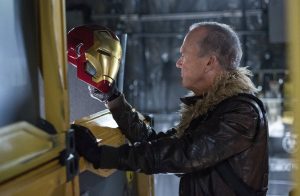 What bothers me about Vulture is that his journey, as well as the film itself, has to work around the big twist that comes late into the second act. It’s a well done twist, yet I find myself thinking about what the film “gives up” – so to speak – in order to make it work. You, in addition to a number of critics and fans, speak about how great it is that Vulture represents the voice of “the little guy,” the blue-collar worker who finds his livelihood under threat from the fat cats. We see him talk about how hard life is for himself and his crew, but that’s about as far as this trait manifests. It’s all dialogue-driven, and I wish we see this play out further in the way Vulture acts as well as in his relationships with his crew. When their job gets taken away from them in the beginning, he mentions that his crew “has families to support,” which is a powerful hook. Yet there’s nothing else that suggests his crew even have families to look out for, and if you ask me, Vulture doesn’t seem to care all that much about their well-being. I think the plot twist shackles how much we can know about Vulture’s life, and that in turn affects Liz since Toomes is her father. (A black character becoming less compelling since that would “better serve” a white character? For a film that attempts to showcase diversity, this makes me feel rather uncomfortable.) Imagine, then, how much more enriching it would be if there was no twist, if the filmmakers decided to withhold nothing and present honestly like Raimi did with Osborn and Octavius. We could see Toomes’ family life in full, how that contributes to his inner conflict (since it’s safe to say his family wouldn’t approve of his line of work), and how that informs the decisions he makes – all the while making his family members compelling characters on their own. I know this is conventional, but I think it would be a fascinating and incredibly effective emotional parallel to Peter’s journey. Plus, I’ve noticed that all of the films in Phase Three of the MCU so far have featured a pretty significant plot twist, so now I worry whether I should expect the same from the upcoming films. I understand I may be nit-picking to the extreme here, but that’s honestly what I think.
What bothers me about Vulture is that his journey, as well as the film itself, has to work around the big twist that comes late into the second act. It’s a well done twist, yet I find myself thinking about what the film “gives up” – so to speak – in order to make it work. You, in addition to a number of critics and fans, speak about how great it is that Vulture represents the voice of “the little guy,” the blue-collar worker who finds his livelihood under threat from the fat cats. We see him talk about how hard life is for himself and his crew, but that’s about as far as this trait manifests. It’s all dialogue-driven, and I wish we see this play out further in the way Vulture acts as well as in his relationships with his crew. When their job gets taken away from them in the beginning, he mentions that his crew “has families to support,” which is a powerful hook. Yet there’s nothing else that suggests his crew even have families to look out for, and if you ask me, Vulture doesn’t seem to care all that much about their well-being. I think the plot twist shackles how much we can know about Vulture’s life, and that in turn affects Liz since Toomes is her father. (A black character becoming less compelling since that would “better serve” a white character? For a film that attempts to showcase diversity, this makes me feel rather uncomfortable.) Imagine, then, how much more enriching it would be if there was no twist, if the filmmakers decided to withhold nothing and present honestly like Raimi did with Osborn and Octavius. We could see Toomes’ family life in full, how that contributes to his inner conflict (since it’s safe to say his family wouldn’t approve of his line of work), and how that informs the decisions he makes – all the while making his family members compelling characters on their own. I know this is conventional, but I think it would be a fascinating and incredibly effective emotional parallel to Peter’s journey. Plus, I’ve noticed that all of the films in Phase Three of the MCU so far have featured a pretty significant plot twist, so now I worry whether I should expect the same from the upcoming films. I understand I may be nit-picking to the extreme here, but that’s honestly what I think.
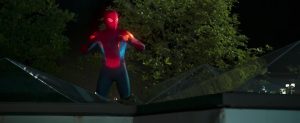 And yes, we’re talking about the suit. Yes, it’s goddamn magnificent. Not only is it sleek, I really appreciate how much of a prominent role it has in the story. The fact that Peter isn’t quite familiar with the suit’s true capabilities reinforces his headstrong adolescence, and it leads to some hilarious scenes. Kudos to Jennifer Connelly, who voices Karen, the suit’s A.I. She’s great here, and I enjoy the chemistry that she and Holland develop. Speaking of costumes, I think it’s worth mentioning how refreshing the film’s wardrobe choices are. The everyday feel to the different shirts and stuff that the cast adorn contributes to the “on the ground” feeling that the film offers.
And yes, we’re talking about the suit. Yes, it’s goddamn magnificent. Not only is it sleek, I really appreciate how much of a prominent role it has in the story. The fact that Peter isn’t quite familiar with the suit’s true capabilities reinforces his headstrong adolescence, and it leads to some hilarious scenes. Kudos to Jennifer Connelly, who voices Karen, the suit’s A.I. She’s great here, and I enjoy the chemistry that she and Holland develop. Speaking of costumes, I think it’s worth mentioning how refreshing the film’s wardrobe choices are. The everyday feel to the different shirts and stuff that the cast adorn contributes to the “on the ground” feeling that the film offers.
I want to ask you two questions. What do you think of the action sequences, and are there any moments and scenes that you could do without? Marvel plucked director-writer Jon Watts from the indie scene, and I think the way that some of the action scenes are filmed does point to his inexperience with this aspect of big-budget filmmaking, though he does shine with the high school content. Personally, I think they could have cut out the Washington, D.C. sequences. There are certainly some nice moments in there, but the film loses some steam once it leaves NYC. It reminds me of Terminator Genisys, which moved the proceedings to San Francisco even though that franchise breathes, bleeds, and screams Los Angeles. The scenes with Donald Glover aren’t necessary either. I know the filmmakers wanted to include him since there was that campaign for him to play Spidey years ago, but they gave him such a lazy, throwaway role. I mean, a poor black criminal (shoutout to my friend Eugene for pointing this out)? No wonder Glover looks as though he doesn’t want to be here.
I certainly can understand your perspective on the less prominent characters and the want for more. My response is, at least you want more. Considering this is the first movie, I think there was a decision made to focus on a few key strengths while laying groundwork for future character growth in the subsequent films. I also think my endorsement of Michelle is driven by how often I see that type of student all the time from working at a university. Aunt May has the foundation of a good character. I look at comic book movies as installments, not standalone films. That’s how comic books work and sometimes you get glimpses of characters/themes that don’t actually become relevant until later. It’s just part of the game. Now to push back on your opinion of Happy’s role, I think it’s more about Tony than it is about Happy. I really do think that Tony did not believe Peter was ready for the world and passed the responsibility onto Happy because he had better things to do. Happy sensed that and felt like he was a glorified babysitter. The difference between Tony and Happy is that Tony believes in the Peter’s potential in a way Happy doesn’t; he’s just too flighty to commit his time ensuring he grows – let Happy monitor his activities in case something real goes down. On the flip side, Happy just sees him as this kid who keeps calling him. That’s just my perspective. Donald Glover was unnecessary in that it didn’t need to be him (the actor). Could have been any random dude buying guns. He did have a great line though (“You need to be better at this part of the job”). Plus Interrogation Mode was worth the price of admission. As for Flash, I probably dislike what he represents moreso than the actually performance. I never like Flash – it just is what it is.
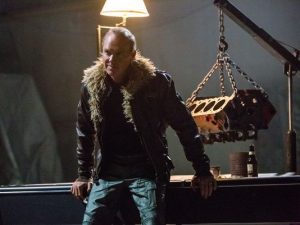 Now look, I will be the first to admit that Green Goblin and Doc Ock set the standard for villains in comic book movies (and who can forget Sir Ian McKellen as Magneto?). However, I think you’re focusing on the wrong thing here. The priority for a successful Spider-Man movie should be its titular character, and Holland is head and shoulders above both Maguire and Garfield in the ability to capture the essence of both Peter and Spider-Man. And it’s not like the surrounding cast or story was a mess – it was clever, and more importantly, felt more authentically Spider-Man than the original films. Re-watching the first two Raimi films makes me realize something: I didn’t know I needed Spider-Man to be young until I saw what a young Spider-Man could be. I will never have the emotional connection to Maguire or Garfield the way I do with Holland. As great as Dafoe and Molina are as villains, I don’t think they are that much better than Keaton to make up that difference. Also, I appreciated the twist and felt that it added something to the story. It created a choice for Peter: let things go because he doesn’t want to face the conflict of taking down his girlfriend’s (well, love interest’s) father or accept the responsibility of the greater good. It’s a classic example of Parker Luck (yes, that’s a thing in the comics) and it felt significant because of that relationship. It’s not just about fighting a villain that could potentially kill him, it’s also about all the consequences he’ll have to accept if he wins. There is no glory in either choice. Additionally, the mercy Toomes showed Parker because he saved his daughter added a level of sympathy that Dafoe never achieved. Dafoe was intense and terrifying – but there was a connection that you could make to Toomes that you couldn’t make to Osborn. And I’m not saying that you should sympathize with Osborn, he’s cruel and terrible (mostly basing this on the comics). But to not see the way Vulture’s representation helped grow the character of Spider-Man and think that it’s on a similar level, I feel like you’re missing the bigger picture of watching a Spider-Man film and appreciating the hero.
Now look, I will be the first to admit that Green Goblin and Doc Ock set the standard for villains in comic book movies (and who can forget Sir Ian McKellen as Magneto?). However, I think you’re focusing on the wrong thing here. The priority for a successful Spider-Man movie should be its titular character, and Holland is head and shoulders above both Maguire and Garfield in the ability to capture the essence of both Peter and Spider-Man. And it’s not like the surrounding cast or story was a mess – it was clever, and more importantly, felt more authentically Spider-Man than the original films. Re-watching the first two Raimi films makes me realize something: I didn’t know I needed Spider-Man to be young until I saw what a young Spider-Man could be. I will never have the emotional connection to Maguire or Garfield the way I do with Holland. As great as Dafoe and Molina are as villains, I don’t think they are that much better than Keaton to make up that difference. Also, I appreciated the twist and felt that it added something to the story. It created a choice for Peter: let things go because he doesn’t want to face the conflict of taking down his girlfriend’s (well, love interest’s) father or accept the responsibility of the greater good. It’s a classic example of Parker Luck (yes, that’s a thing in the comics) and it felt significant because of that relationship. It’s not just about fighting a villain that could potentially kill him, it’s also about all the consequences he’ll have to accept if he wins. There is no glory in either choice. Additionally, the mercy Toomes showed Parker because he saved his daughter added a level of sympathy that Dafoe never achieved. Dafoe was intense and terrifying – but there was a connection that you could make to Toomes that you couldn’t make to Osborn. And I’m not saying that you should sympathize with Osborn, he’s cruel and terrible (mostly basing this on the comics). But to not see the way Vulture’s representation helped grow the character of Spider-Man and think that it’s on a similar level, I feel like you’re missing the bigger picture of watching a Spider-Man film and appreciating the hero.
 Oh man, the suit. The suit brings me to another thing I loved about the film. It’s very hard for an actor to carry a sequence independently, and Holland did a great job keeping me engaged in both his solitary patrol moments and during the warehouse scene. He’s just got a great presence. I think back to that silly skateboard scene in The Amazing Spider-Man; while I love Garfield as an actor, that was not great cinema. Back to the suit – they did a great job of taking the old school look but capitalizing off of the fact that they had Stark. They could have gone the traditional route but Karen added a fun chemistry to the film. Additionally, part of the fun of superhero origin stories is seeing characters learn to harness their powers (the most fatal sin of the Fantastic 4 reboot is forgetting this). This gave us a really great sequence that provided that fun without having to retread old material. Just an inspired idea.
Oh man, the suit. The suit brings me to another thing I loved about the film. It’s very hard for an actor to carry a sequence independently, and Holland did a great job keeping me engaged in both his solitary patrol moments and during the warehouse scene. He’s just got a great presence. I think back to that silly skateboard scene in The Amazing Spider-Man; while I love Garfield as an actor, that was not great cinema. Back to the suit – they did a great job of taking the old school look but capitalizing off of the fact that they had Stark. They could have gone the traditional route but Karen added a fun chemistry to the film. Additionally, part of the fun of superhero origin stories is seeing characters learn to harness their powers (the most fatal sin of the Fantastic 4 reboot is forgetting this). This gave us a really great sequence that provided that fun without having to retread old material. Just an inspired idea.
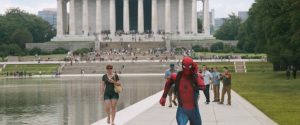 I’d be hard pressed to find something about the film that I didn’t like, but I might say that some of the sequences towards the beginning of the movie seemed like they could be a bit shorter. As charming as the patrols were, and though the conversations Peter had with Ned were hilarious, I could see how if you took those down about 10 percent and added some content to other characters, you might get a better product. I had no problems with the D.C. trip. It gave us another chance to see Peter put off being a teenager because he wants to carry the weight of a superhero. It gave us a moment to see his technological savvy because of the locator issue and it forced him to work with Ned to hack the suit. It also highlighted his “ready, fire, aim” mentality that ended being his Achilles heel during the course of the movie. All things that are relevant to the character. I felt fine with the action sequences because there’s a level of “winging it” that you always get with Spider-Man, and the flawed moments added to the mood of the film. It felt like it should be a bit unpolished – not in a gritty way but in an inexperienced way. I’d much rather have funny moments like him running through a golf course or hitting a fence in a herky-jerky manner than a perfectly executed sequence. My problem may be that I don’t really care if the filmmaking is perfect – I appreciate the idea more than the execution. Speaking of his clumsiness, I am surprised to say that the lack of Spidey-Sense was not a problem for me at all. Considering the upgrades the suit has, it makes the power a bit redundant. Also, I can imagine that being a part of his growth as a superhero so I’m looking forward to the evolution of his powers.
I’d be hard pressed to find something about the film that I didn’t like, but I might say that some of the sequences towards the beginning of the movie seemed like they could be a bit shorter. As charming as the patrols were, and though the conversations Peter had with Ned were hilarious, I could see how if you took those down about 10 percent and added some content to other characters, you might get a better product. I had no problems with the D.C. trip. It gave us another chance to see Peter put off being a teenager because he wants to carry the weight of a superhero. It gave us a moment to see his technological savvy because of the locator issue and it forced him to work with Ned to hack the suit. It also highlighted his “ready, fire, aim” mentality that ended being his Achilles heel during the course of the movie. All things that are relevant to the character. I felt fine with the action sequences because there’s a level of “winging it” that you always get with Spider-Man, and the flawed moments added to the mood of the film. It felt like it should be a bit unpolished – not in a gritty way but in an inexperienced way. I’d much rather have funny moments like him running through a golf course or hitting a fence in a herky-jerky manner than a perfectly executed sequence. My problem may be that I don’t really care if the filmmaking is perfect – I appreciate the idea more than the execution. Speaking of his clumsiness, I am surprised to say that the lack of Spidey-Sense was not a problem for me at all. Considering the upgrades the suit has, it makes the power a bit redundant. Also, I can imagine that being a part of his growth as a superhero so I’m looking forward to the evolution of his powers.
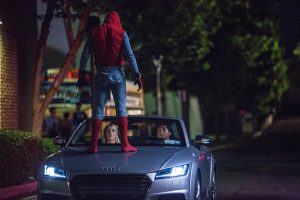 If there is an area that they can do more of (and where I agree with you), it’s the high school stuff. Every moment spent learning more about Peter the kid was either fun or heartwarming. It’s where the strength lies in this cast and story, and they probably missed a few opportunities to capitalize off of the youthful energy of the cast because they will soon grow out of this stage of their lives. But this is less about being critical of the movie and more about missed opportunities – I just don’t know that they’ll be able to recapture the chance again. But overall, I like the “unfinishedness” of the movie. It’s the first time I left the theater thinking to myself that I just saw a chapter of a greater story. Not in the MCU, but for Spider-Man. All the other films in the MCU tend to be standalone products for their characters (while fitting into the MCU) but this did give me that feeling of reading a comic – there were seeds planted that will be released in the next issue in a clear and obvious way. It wasn’t just one character that could come back or a teaser at the end, it was ingrained in the film’s DNA that there is more to cover. That might be another reason you didn’t enjoy it as much as the Raimi films.
If there is an area that they can do more of (and where I agree with you), it’s the high school stuff. Every moment spent learning more about Peter the kid was either fun or heartwarming. It’s where the strength lies in this cast and story, and they probably missed a few opportunities to capitalize off of the youthful energy of the cast because they will soon grow out of this stage of their lives. But this is less about being critical of the movie and more about missed opportunities – I just don’t know that they’ll be able to recapture the chance again. But overall, I like the “unfinishedness” of the movie. It’s the first time I left the theater thinking to myself that I just saw a chapter of a greater story. Not in the MCU, but for Spider-Man. All the other films in the MCU tend to be standalone products for their characters (while fitting into the MCU) but this did give me that feeling of reading a comic – there were seeds planted that will be released in the next issue in a clear and obvious way. It wasn’t just one character that could come back or a teaser at the end, it was ingrained in the film’s DNA that there is more to cover. That might be another reason you didn’t enjoy it as much as the Raimi films.
Speaking of the MCU, how do you think Spidey fits into the rest of the universe? As young as he is, he often ends up being one of the main characters in comic team-up events, and I wonder if Marvel is ready to give Holland the same type of spotlight they give the original Avengers in future films. How do you see the character growing, and what do you think he brings to the table that will benefit the group? Are there things that you’re concerned about as they move forward?
To respond to your rebuttal regarding Vulture, I won’t argue that the twist and the choice it presents force Peter to grow because it’s pretty obvious (and effective). What I was saying is that the twist essentially limits Toomes and Liz’s emotional development, and I prefer that they flesh them out even more so that it would further intensify the emotional stakes in the climax. Like I said, it’s a well done twist (Lord knows it surprised me when I was watching the film), but I believe that presenting Toomes and Liz honestly from the beginning would make for a more enriching experience, if that makes sense. Then again, I’m likely biased since Spider-Man and Spider-Man 2 spoiled me by providing such thorough and moving emotional arcs for their villains. Toomes is a great villain, but I connected more with Osborn and Octavius, if you know what I mean. I remember chatting with you about Homecoming a few days ago, and you mentioned that you may be evaluating the film as a Spider-Man product, whereas I may be coming at it as just a movie. After giving it some thought and reading through our responses so far, I think that rings true.
 I agree with your thoughts regarding the D.C. trip, so some clarity and a slight correction on my part are in order. When I was mentioned the D.C. stuff, my thoughts were mostly on the Washington Monument sequence, which I’m not the biggest fan of since I think it’s unnecessary. I forgot for a moment that Peter getting acquainted with the suit and also bonding a bit with his classmates were set in DC as well (though I wish they had set this in another part of NYC instead), and I enjoyed those scenes since they’re meant to highlight the fact that Peter is ultimately a kid. I also agree with your critique that some of the sequences near the beginning of the film could be shorter. One thing that worth noting about the film is that it has six credited screenwriters (Jonathan Goldstein, John Francis Daley, Jon Watts, Christopher Ford, Chris McKenna, and Erik Sommers). I think this shows at times, especially when we notice certain jokes or moments that feel repetitive (May being hot, Ned barraging Peter with questions) or try too hard to earn our laughs, which makes the film lose steam. At times, the film tries to juggle too much, and if the task for the writers was to streamline it, they didn’t do a great job, despite there being a bunch of parts that truly shine, such as Tony taking back the suit from Peter, Toomes threatening Peter before the dance, and the ferry sequence.
I agree with your thoughts regarding the D.C. trip, so some clarity and a slight correction on my part are in order. When I was mentioned the D.C. stuff, my thoughts were mostly on the Washington Monument sequence, which I’m not the biggest fan of since I think it’s unnecessary. I forgot for a moment that Peter getting acquainted with the suit and also bonding a bit with his classmates were set in DC as well (though I wish they had set this in another part of NYC instead), and I enjoyed those scenes since they’re meant to highlight the fact that Peter is ultimately a kid. I also agree with your critique that some of the sequences near the beginning of the film could be shorter. One thing that worth noting about the film is that it has six credited screenwriters (Jonathan Goldstein, John Francis Daley, Jon Watts, Christopher Ford, Chris McKenna, and Erik Sommers). I think this shows at times, especially when we notice certain jokes or moments that feel repetitive (May being hot, Ned barraging Peter with questions) or try too hard to earn our laughs, which makes the film lose steam. At times, the film tries to juggle too much, and if the task for the writers was to streamline it, they didn’t do a great job, despite there being a bunch of parts that truly shine, such as Tony taking back the suit from Peter, Toomes threatening Peter before the dance, and the ferry sequence.
 I’m pretty optimistic about Spider-Man’s place in the MCU – provided, of course, that Marvel Studios and Sony remain happy with their deal and want to renegotiate so that it includes further films (the remaining films on the current deal are the Homecoming sequel as well as the two upcoming Avengers films). In fact, the only thing that concerns me is the (hopefully nonexistent) possibility that Sony decides to close shop at the end of this current deal. At the very least, bringing Spider-Man further into the fray will offer some pretty meaty relationship dynamics, especially with the Avengers films; imagine someone like Bruce Banner/Hulk or Doctor Strange interacting with Peter, or rather, having to put up with him. I doubt Kevin Feige and co. are hesitant about giving Spider-Man the same spotlight as they did with the original Avengers. From what I see, audiences are loving Homecoming and its Spider-Man, so if there’s ever a prime opportunity for them to include him in one of their Phase Three or Phase Four films, they’ll seize it – so long as it makes sense from a story standpoint. As to how they’ll use him, I honestly don’t know, but I’m certain he’s destined for great things. Once Phase Three is done and dusted, and should Marvel and Sony decide to continue this oh-so-special relationship, I expect Spidey to be one of the “new” faces for Phase Four alongside the likes of Strange and Captain Marvel (as you can surmise, I have a feeling that a handful of the original Avengers won’t come back). I do think it’s safe to say that he’ll be one of the more prominent characters in team-up events, similar to Thor in the first Avengers.
I’m pretty optimistic about Spider-Man’s place in the MCU – provided, of course, that Marvel Studios and Sony remain happy with their deal and want to renegotiate so that it includes further films (the remaining films on the current deal are the Homecoming sequel as well as the two upcoming Avengers films). In fact, the only thing that concerns me is the (hopefully nonexistent) possibility that Sony decides to close shop at the end of this current deal. At the very least, bringing Spider-Man further into the fray will offer some pretty meaty relationship dynamics, especially with the Avengers films; imagine someone like Bruce Banner/Hulk or Doctor Strange interacting with Peter, or rather, having to put up with him. I doubt Kevin Feige and co. are hesitant about giving Spider-Man the same spotlight as they did with the original Avengers. From what I see, audiences are loving Homecoming and its Spider-Man, so if there’s ever a prime opportunity for them to include him in one of their Phase Three or Phase Four films, they’ll seize it – so long as it makes sense from a story standpoint. As to how they’ll use him, I honestly don’t know, but I’m certain he’s destined for great things. Once Phase Three is done and dusted, and should Marvel and Sony decide to continue this oh-so-special relationship, I expect Spidey to be one of the “new” faces for Phase Four alongside the likes of Strange and Captain Marvel (as you can surmise, I have a feeling that a handful of the original Avengers won’t come back). I do think it’s safe to say that he’ll be one of the more prominent characters in team-up events, similar to Thor in the first Avengers.
 To be honest, in regards to Spidey’s future, I care more about a Homecoming sequel than his place in an Avengers or some kind of team-up film, where he would have to share the spotlight. Despite its faults, this film does succeed in molding together a Peter/Spider-Man whom I can emotionally invest in, and I’m very interested to see where his journey takes him next. As you noted earlier, the fact that May knows about Peter being Spider-Man opens a Pandora’s Box of ideas, and that’s one of the first things he’ll have to deal with. I don’t think this is the end of his high school experiences as far as direct sequels go – at least, I hope not. While Peter does mature by this film’s end, he’s still a kid and acts like one, and I’m sure his adolescence will still pose plenty of problems for his life as a superhero. I look forward to seeing what lessons he has to learn or what he has to reinforce in his next set of adventures, whether it be his junior or senior year. I hope that the sequel will really take advantage of the high school experience and build upon characters like Ned and Michelle. I ask only for two specific things: no significant plot twist and the inclusion of Hammerhead.
To be honest, in regards to Spidey’s future, I care more about a Homecoming sequel than his place in an Avengers or some kind of team-up film, where he would have to share the spotlight. Despite its faults, this film does succeed in molding together a Peter/Spider-Man whom I can emotionally invest in, and I’m very interested to see where his journey takes him next. As you noted earlier, the fact that May knows about Peter being Spider-Man opens a Pandora’s Box of ideas, and that’s one of the first things he’ll have to deal with. I don’t think this is the end of his high school experiences as far as direct sequels go – at least, I hope not. While Peter does mature by this film’s end, he’s still a kid and acts like one, and I’m sure his adolescence will still pose plenty of problems for his life as a superhero. I look forward to seeing what lessons he has to learn or what he has to reinforce in his next set of adventures, whether it be his junior or senior year. I hope that the sequel will really take advantage of the high school experience and build upon characters like Ned and Michelle. I ask only for two specific things: no significant plot twist and the inclusion of Hammerhead.
I imagine you have plenty of ideas, thoughts, and desires about Spider-Man’s future (both in the MCU and for his own films), so I’d love to hear them. And at last, do you have any final thoughts about Homecoming?
I think we’re going to end up having to agree to disagree on this one. I really do think Homecoming is a step up from the original Raimi film but I’m definitely willing to cede to you that Spider-Man 2 is probably a more well done cinematic experience. But like I said, if you’re a Spider-Man fan, I’d guess that this was a breath of fresh air and takes the cake when it comes to Spidey on the big screen.
I’m a little less optimistic about their continuation of the high school feel, not because they won’t try to, but because youth is fleeting and I wonder how the cast themselves will age in real life. Maybe I didn’t make that clear. However, I echo your enthusiasm for the future Spider-Man films over his stints within the greater MCU. I touched on this in my last section but I can’t stress enough how much this feels like more than just a story that is looking to introduce a character for the sake of building towards the MCU. Ant-Man and Doctor Strange – both movies I enjoyed but did not give me the same sense of opportunity that Homecoming did. Does that make sense at all?
 In order to maintain continuity with the rest of the MCU, I think it’s important to continue to stress the alien tech and really lean on villains that can capitalize on that type of organic tie-in with the rest of the universe. I’d target villains like Doc Ock and Scorpion as a way to link to the Vulture if Keaton is willing to reprise his role as Toomes. If people are interested, they can check out some of my ideas for potential villains and wish list casting here. I’d probably pick Scorpion or Kraven the Hunter at this point because I think both would give writers an opportunity to inject J. Jonah Jameson as a character in a meaningful way. Both being hunters in their own right, it would be fun seeing Peter as their prey, and when you add in Midtown High School as a backdrop, there’s endless potential for shenanigans. Black Cat would also be fun in any future film because of Holland’s awkwardness – could you imagine him having to deal with a hot older woman trying to seduce him? I think there’s lots of comedic value to be gained from that type of situation. The main thing is that they’ve really just scratched the surface of how trying to be a high school student conflicts with being a hero, and ensuring they continue to hammer home (not Hammerhead, for the love of God) just how difficult a burden that is for Peter, I think they’ll have a winner. One last wish (and I know I’m basically recycling my old stuff) is to see Spider-Man and Daredevil team-up to face off against Kingpin. He’s the right type of villain that really brings out the best of Spidey, and there have been some classic Murdock/Parker team-ups.
In order to maintain continuity with the rest of the MCU, I think it’s important to continue to stress the alien tech and really lean on villains that can capitalize on that type of organic tie-in with the rest of the universe. I’d target villains like Doc Ock and Scorpion as a way to link to the Vulture if Keaton is willing to reprise his role as Toomes. If people are interested, they can check out some of my ideas for potential villains and wish list casting here. I’d probably pick Scorpion or Kraven the Hunter at this point because I think both would give writers an opportunity to inject J. Jonah Jameson as a character in a meaningful way. Both being hunters in their own right, it would be fun seeing Peter as their prey, and when you add in Midtown High School as a backdrop, there’s endless potential for shenanigans. Black Cat would also be fun in any future film because of Holland’s awkwardness – could you imagine him having to deal with a hot older woman trying to seduce him? I think there’s lots of comedic value to be gained from that type of situation. The main thing is that they’ve really just scratched the surface of how trying to be a high school student conflicts with being a hero, and ensuring they continue to hammer home (not Hammerhead, for the love of God) just how difficult a burden that is for Peter, I think they’ll have a winner. One last wish (and I know I’m basically recycling my old stuff) is to see Spider-Man and Daredevil team-up to face off against Kingpin. He’s the right type of villain that really brings out the best of Spidey, and there have been some classic Murdock/Parker team-ups.
As far as his role goes in the big Avenger properties, I hope they make him a vocal moral compass for the group. Also, as many opportunities to pair him up with one of the adults to see how each character handles his youthful enthusiasm and lack of brevity will always make him shine. You can look no further than his fight with Winter Soldier and Falcon in Civil War to see the amusing chemistry he has with heroes that are a bit longer in the tooth. Because of this, he’s consistently underestimated and constantly exceeds the expectations of those around him. Hopefully they’ll be able to capture that and really lift Spidey up as the everyman’s hero.
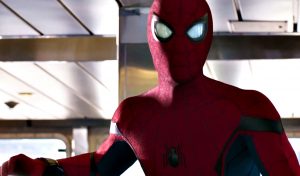 After this discussion, I’m almost inclined to adjust my gut rating because I can certainly understand your (incorrect) perspective that this is not the best Spider-Man film. However, I see all the wonderful things they did to bring my favorite superhero to life in a way that’s never been done before, and I’m going to stick with my original thought and give it full marks. I wouldn’t be low-brow if I didn’t own my identity and embrace the subjective. It did such a wonderful homage paying tribute to the past (check out this little write up on Spidey’s history being trapped under rubble [EDITOR’S NOTE: to see this spoiler, hold down the CTRL key and click]… I got goosebumps during that scene!) while also upgrading him for the modern world of superheroes. Much like reading comics, I always find the individual character stories more compelling than the group events and this was no different. I applaud Feige and co. for creating a movie that lays the groundwork for its own universe, which has been one sticking point for me with Marvel movies. All the character films they’ve released to this point have felt like drivers for the Avengers product – it’s nice to see something embrace its characters so willingly, and I am left chomping at the bit for more of our friendly neighborhood Spider-Man.
After this discussion, I’m almost inclined to adjust my gut rating because I can certainly understand your (incorrect) perspective that this is not the best Spider-Man film. However, I see all the wonderful things they did to bring my favorite superhero to life in a way that’s never been done before, and I’m going to stick with my original thought and give it full marks. I wouldn’t be low-brow if I didn’t own my identity and embrace the subjective. It did such a wonderful homage paying tribute to the past (check out this little write up on Spidey’s history being trapped under rubble [EDITOR’S NOTE: to see this spoiler, hold down the CTRL key and click]… I got goosebumps during that scene!) while also upgrading him for the modern world of superheroes. Much like reading comics, I always find the individual character stories more compelling than the group events and this was no different. I applaud Feige and co. for creating a movie that lays the groundwork for its own universe, which has been one sticking point for me with Marvel movies. All the character films they’ve released to this point have felt like drivers for the Avengers product – it’s nice to see something embrace its characters so willingly, and I am left chomping at the bit for more of our friendly neighborhood Spider-Man.
Plus, this is the first Spider-Man movie that made my wife like Spider-Man. That alone is worth any warts you might imagine the movie has. Do you know how hard it is to have a wife who likes superhero movies only to dislike your favorite superhero?
I’m nowhere close to having a wife (much less one who likes superhero movies only to dislike my favorite superhero), but I can imagine how hard that is.
What you said about Homecoming feeling more than just another building block for the MCU definitely makes sense. This is probably the first MCU film that left me wanting more even after the credits started rolling, as the other films do have a firm sense of conclusion when they end. Perhaps this is the comic book reading experience you alluded to earlier?
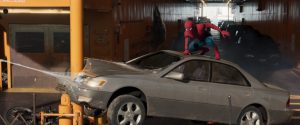 With you being the resident Spider-Man connoisseur, I’m not surprised to see that you have plenty of ideas for where you’d like our web-slinger to go for his future. I’m still holding onto my Hammerhead dreams, but I’d be down to see Scorpion or Kraven come to the big screen (though Sony is reportedly eyeing a Kraven film for its own cinematic universe). I will say, though, that if Marvel wants to milk this high school environment for all it’s worth, we may not see Jameson for a while. I was about to question your Black Cat idea since it seems rather sexually inappropriate (given that Peter would be a minor) for the MCU’s audience, but then I remembered that Homecoming brims with innuendos regarding May, blurts out “penis” several times, and drops a porn joke – so I guess your idea could work. Sadly, I don’t think your Daredevil/Spidey team-up against Kingpin will see the light of day in this cinematic universe. Regardless, exciting times lie ahead for Spider-Man, and I look forward to seeing them unfold on the big screen.
With you being the resident Spider-Man connoisseur, I’m not surprised to see that you have plenty of ideas for where you’d like our web-slinger to go for his future. I’m still holding onto my Hammerhead dreams, but I’d be down to see Scorpion or Kraven come to the big screen (though Sony is reportedly eyeing a Kraven film for its own cinematic universe). I will say, though, that if Marvel wants to milk this high school environment for all it’s worth, we may not see Jameson for a while. I was about to question your Black Cat idea since it seems rather sexually inappropriate (given that Peter would be a minor) for the MCU’s audience, but then I remembered that Homecoming brims with innuendos regarding May, blurts out “penis” several times, and drops a porn joke – so I guess your idea could work. Sadly, I don’t think your Daredevil/Spidey team-up against Kingpin will see the light of day in this cinematic universe. Regardless, exciting times lie ahead for Spider-Man, and I look forward to seeing them unfold on the big screen.
 Spider-Man: Homecoming is a good film, but for me, it falls short of being a great one. The filmmakers clearly want to accomplish a lot with this film, and they do succeed in making an playful and spirited Spider-Man movie featuring a charismatic lead performance and some knockout moments. However, to quote Tony’s words to Peter in the film, “I wanted you to be better.” And I believe the film could be better. Even when setting aside my personal thoughts on how the film handles Vulture, I think the film has a number of unnecessary scenes, is guilty of trying too hard at times to the point where the pacing gets erratic, and doesn’t utilize its high school environment and diversity as well as it could have (this is noticeably still the white man’s playground). On the same level as Spider-Man and Spider-Man 2 this is not. When I look at those two films, I see well-rounded and purposeful pictures. Despite its tremendous effort and good intentions, I can’t really say the same for Homecoming.
Spider-Man: Homecoming is a good film, but for me, it falls short of being a great one. The filmmakers clearly want to accomplish a lot with this film, and they do succeed in making an playful and spirited Spider-Man movie featuring a charismatic lead performance and some knockout moments. However, to quote Tony’s words to Peter in the film, “I wanted you to be better.” And I believe the film could be better. Even when setting aside my personal thoughts on how the film handles Vulture, I think the film has a number of unnecessary scenes, is guilty of trying too hard at times to the point where the pacing gets erratic, and doesn’t utilize its high school environment and diversity as well as it could have (this is noticeably still the white man’s playground). On the same level as Spider-Man and Spider-Man 2 this is not. When I look at those two films, I see well-rounded and purposeful pictures. Despite its tremendous effort and good intentions, I can’t really say the same for Homecoming.
Andrew’s Rating: 5.0/5.0
Jun’s Rating: 3.5/5.0
* Photos courtesy of Sony Pictures
